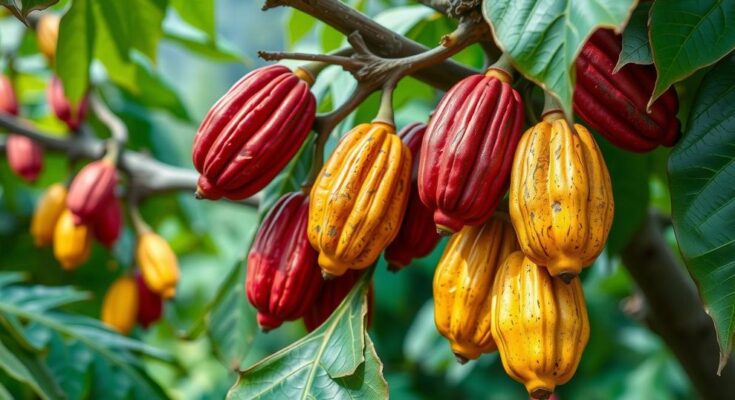Brazil may capture 13% of the global cocoa market by 2030, with potential revenues of $2.3 billion and the creation of 300,000 jobs, as per a study by Instituto Aya. The country has competitive advantages in all cocoa supply chain stages, despite challenges like limited credit access and pest threats. Recommendations include favorable credit lines and improved support for cocoa producers.
Brazil has the potential to recapture a noteworthy position in the global cocoa market, previously held in the 1980s, with the possibility of attaining a 13% market share by 2030. A study conducted by Instituto Aya, part of Aya Partners, reveals that Brazil could generate up to $2.3 billion in cocoa-related revenue, along with the potential to create approximately 300,000 jobs. Even conservative estimates suggest a revenue of $1.5 billion, asserting a 9% global market share.
The competitive advantage Brazil holds spans all stages of the cocoa supply chain. With significant backing from entities like Embrapa and the Executive Committee of the Cocoa Plan, Brazil is one of the largest producers of cocoa seedlings and specialized machinery. The country has also established a strong knowledge base in agroforestry cocoa cultivation, which is essential for enhancing the growth environment of cocoa.
Expansion opportunities exist in Brazil’s cocoa sector due to the availability of degraded pastureland. Advocates propose that cocoa should be prioritized in the government’s forthcoming Degraded Pastureland Conversion Program. Nevertheless, challenges remain, particularly regarding limited access to credit—where only 0.05% of agricultural credit is earmarked for cocoa—and issues related to low productivity and pest threats like witches’ broom disease.
Integrating cocoa cultivation into forest restoration initiatives also presents a potential growth avenue. While the state of Pará has enacted regulations for cocoa cultivation in legal reserves, a national law governing this practice remains absent. Furthermore, the country’s cocoa processing sector is well-established, with major players and bean-to-bar chocolatiers present, revealing significant growth potential through targeted investments.
The study emphasizes that Brazil, as both a major supplier and a significant chocolate consumer, is well-positioned in chocolate manufacturing. Recommendations to bolster the sector include creating favorable credit lines with lower interest rates, facilitating forward contracts between cocoa processors and farmers to stabilize prices, and enhancing rural technical assistance programs. Investment in mechanization and innovative technologies is essential to overcome the pest challenges faced by Brazilian cocoa plantations.
In conclusion, Brazil is poised to reestablish itself as a key player in the global cocoa market, with substantial potential for revenue generation and job creation. While obstacles such as access to credit and pest management persist, strategic recommendations including financial innovations and investment in technology can enhance the country’s cocoa supply chain. With committed efforts, Brazil may successfully reclaim its former prominence in cocoa production.
Original Source: valorinternational.globo.com




